SAPPI – LUFIL PACKAGING: Partnerships Drive Promising Paper Innovation
2020’s tough market conditions taught us all to be innovative, dynamic and quick off the mark in order to stay afloat and in-business. This was certainly the case for Sappi who required a new market for an already declining Newsprint paper machine. Lufil Packaging required a local and consistent supplier of unbleached kraft paper for their bag manufacturing plant. And as a result of great partnerships, an exciting new product, PrimePak Unbleached, was launched. It has taken the QSR market by storm, as brands search for environmentally-friendly packaging materials that are strong enough to get food to customers through new home delivery platforms.
In 2020, as the full impact of the Covid pandemic became obvious, there was despair and worry, but also invention. People were locked in their homes, prevented from visiting stores or interacting with each other. This was a troubling time for most businesses, forcing them to adapt or close. An example of quick adaption was observed in the retail and food sectors, where deliveries to the home boomed in South Africa. Around the world, in the US, delivery service Instacart reported achievement of its monetary targets for a 24-month period in just three weeks as restrictions on movement were implemented.
In South Africa, major restaurant chains and supermarkets upped their digital presence during the lockdown periods, partnering with platforms like Uber Eats and Mr D Food to get products to customers as efficiently as possible.
But a problem became apparent. The packaging used in transit was not as good as it could be. The quick increase in volume developed a need for a tough, reliable and sustainable solution.
“Now, the packaging must be more robust than it was previously as it takes more knocks as it travels from restaurant to home. Our QSR customers have asked us for more robust packaging. The easy win was to switch to virgin kraft paper which offers tensile and burst strength,” says Stephen Weston, Managing Executive at Lufil Packaging, the Johannesburg-head-quartered manufacturer of paper bags and related products, part of the Bidvest Group.
INNOVATION & DEVELOPMENT
Lufil Packaging engaged with clients to understand the quickly changing needs in the paper bag market before approaching potential suppliers to assist in solving the problem.
At the same time Sappi was facing their own challenges. A rapid decline in market demand for Newsprint had been observed over the last few years, but when COVID-19 hit in early 2020, the demand fell so critically that something had to change, and fast. The Sappi Southern Africa business had acted with speed to find other markets that could assist in filling the Newsprint machine as well as supplying an alternate market.
“Our newsprint machine was battling during COVID,” says Product & Development Manager at Sappi, Katherine Wölke. “The newsprint machine was offline for months, not running, and we were not sure of what the future of that machine looked like. We didn’t want to lose jobs or carousel the machine altogether, so we were tasked with finding a new market to share the machine with. Some market research was required, a lot of discussions with Lufil Packaging and other key customers was had and a new product, PrimePak Unbleached (PPU), was developed within three months.”
PPU is an uncoated, unbleached kraft paper, designed for various flexible packaging applications, such as secondary fast-food packaging, specialised grocery bags, home and fashion bags, consumer electronics and general point of sale packaging as well as wrapping paper. It is made up of a higher percentage of virgin fibre giving it excellent strength properties. Brilliant printability, higher speeds through the converting machines, less breakages and waste are experienced, are just some of the benefits to using Sappi’s PPU range.
“It has been a major success in terms of machine productivity and customer satisfaction,” says Weston, who has been using the product for major brands including Nando’s and Steers.
“Sappi approached us with a project around making grades of paper which would be a majority virgin as opposed to 100% recycled paper that we had been using previously. We did some trialling, we launched the product with Nando’s and it was such a success that we have rolled it out to all customers. We use around 400 tonnes each month and it has been very positive,” he adds.
STRENGTH PROPERTIES
Recycled fibres are short and weak, which is only suitable for some product applications. However, using majority virgin fibres means that the fibres are longer and provide paper with muscle, perfectly suited to the nature of home delivery.
“PPU is a great product, the strength properties are there,” reiterates Wölke. “It is unique and sets us apart from our competitors. The trend around online deliveries that emerged in 2020 has not stopped growing.”
Because of such aggressively growing demand, both Wölke and Weston are confident that PPU will become central in strategy for end-users. In terms of the lifecycle of paper products, the addition of new fibres is only a benefit to the longer-term circular process and breathes new life into paper bag products requiring strength, longevity and functionality.
“It is important to remember that there is a time and place for both virgin and recycled fibre. All that is required is to understand the end-use application and what properties are required to ensure that the product meets the demands of the end-use. It is also important to remember that without new virgin fibre in the cycle, there would be no fibre to recycle. In other words, we would need virgin fibre to ensure that there is enough recycled fibre in the market. There needs to be a union between virgin and recycled fibres,” says Wölke.
“There always needs to be fresh fibre that needs to be put into the mix to give products some strength,” agrees Weston. “We still bring in a lot of material that is semi or fully recycled but in terms of our lightweights (50, 60 and 80 gsm), it needs that extra strength to run through the equipment effectively.”
Highlighting the success of PPU, Nando’s, Spur, Steers, Wimpy, KFC, and a host of other national and international brands have adopted the product. Lufil Packaging now runs PPU for the majority of its QSR clients.
Importantly, PPU is not only perfectly crafted for its purpose, it also serves as a beacon of what is possible from a sustainability perspective, high on the agenda of both Lufil Packaging, Bidvest and Sappi.
FSC™ CERTIFIED
Sappi takes sustainability and the planet seriously. Sappi have ensured that their food paper packaging products offered to the market tick all the sustainable boxes. PPU is produced locally using locally grown trees. In full adherence to Forestry Stewardship Council (FSC™) requirements, Sappi acts as a champion for sustainable forestry, working to keep forestland forested for generations to come.
“The PPU product range is FSC™ certified. Sappi follow very strong values and ethics in ensuring conservation,” says Wölke.
Sappi owns and leases 394,000 hectares of land in South Africa. One third of this land is managed for biodiversity conservation. There are approximately 160 Important Conservation Areas (ICAs) and seven declared nature reserves all within Sappi managed land. Sappi have established a biodiversity 2025 target to enhance biodiversity in our conservation areas by 10% per annum.
For Weston and Lufil Packaging, this commitment to sustainability fits perfectly with his message to clients. “From the moment the tree is planted until it arrives at Lufil’s factory, that chain follows strict processes,” he says, adding that sustainability has moved to the top of the agenda for many brand managers in South Africa.
Sappi’s mill in Ngodwana, Mpumalanga is responsible for all of the production of PPU, located right at the heart of the company’s commercial forestry operation. The mill produces 210,000 tons of unbleached chemical pulp, 110,000 tons of mechanical pulp, 255,000 tons of dissolving pulp and 380,000 tons of paper (newsprint and kraft linerboard used for packaging) per annum.
“Sappi has a strong forestry presence in the area, including a lot of good socio-economic work. All of the pulp that is used for this product is from those forests,” says Weston.
ALWAYS GROWING
The development of PPU, in such a tight timescale, against a challenging economic backdrop was recognised by Sappi, awarding the PPU project team the Technical Innovations Award (TIA). The TIAs are an internal initiative from Sappi spanning the entire global group and highlighting innovation and success.
Taking all of the positivity achieved so far, there is much more to come from PPU. Both Sappi and Lufil Packaging are expecting ongoing improvement and the companies are looking forward with ambition.
“There’s always innovation to ensure we are ahead of the curve,” smiles Wölke. “We work closely with Lufil Packaging to understand what opportunities there are in the market. The primary market right now is in QSR and with the grocery retailers,” she says, adding that the company would love to get into wider home delivery space. “We need to achieve specifications that the industry is looking for and that is our ongoing development.”
Lufil Packaging and Weston are riding the wave and the company is always looking for opportunities to expand its offering.
“There is huge demand here right now – if you can’t sell a paper bag then there is something wrong with you,” he smiles. “We are still not legislated to use paper bags and plastic bags are used freely. However, people with an ethical approach are swapping to recyclable plastic or paper. There is major demand for paper bags from retail, grocery, textile, fast food and agriculture. We have purchased four new machines and around 20 new people in the past year to cope with demand, especially in the shopper carrier bag sectors.”
Clearly, there is more to come from this exciting product and positive partnership. With every business trying hard to satisfy price-conscious clients, the ability to offer value alongside high quality is essential. Thankfully, Sappi and Lufil packaging can deliver in abundance.
What was created in a time of shift across industries is now promoting a change agenda of its own. If PPU can become the dominant material in the QSR and grocery sectors in just three years, there is no telling what will come next. Sappi will ensure sustainability is at the core of anything developed and Lufil Packaging will ensure clients and end users are delighted with what is produced.


